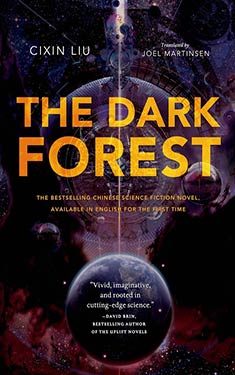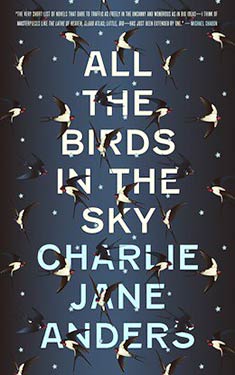Cixin Liu
Completed 4/22/2017, Reviewed 4/23/2017
4 stars
I picked this book up at the library when I realized that
all the Hugo nominees except the one I was holding in my hand were checked out. I got this crazy notion up my butt to read
all the Hugo nominees this year. As I
looked through the list, I realized some were the second books of series of
which I hadn’t read the first book, and one of the nominees was the third book
of a trilogy of which I only read the first book. That first book was The Three-Body Problem which I read for book club and gave four stars.
So since the library had the second book, I decided to pick it up and
give it a try. It was better than I
expected for the second book of a trilogy.
Usually, I find the second book to be a coasting, a long setup for the denouement
of the third book. This book, though a tough read, was nearly self-contained
and had a very interesting plot.
 The story continues with earth reeling from figuring out
that it will be invaded by the Trisolarans in 400 years. Any attempts to come up with a resistance or
solution is undermined by the existence of sophons, particles with the dual
role of spying on humanity and suppressing technological development. Because of the eleven-dimensional sophons,
the Trisolarans know instantaneously what kind of resistance Earth may be
devising. So it comes up with a plan to
choose four individuals to devise counter plans that only they know the full
extent of. Called Wallfacers, the plans
are safely locked in the minds of these people, unshared with anyone. Three of the four are well-known
leaders. The fourth person is Luo Ji, an
astronomer and sociologist who doesn’t want to be a Wallfacer. The book mostly follows Luo in his attempt to
come up with some kind of plan to repel the invaders.
The story continues with earth reeling from figuring out
that it will be invaded by the Trisolarans in 400 years. Any attempts to come up with a resistance or
solution is undermined by the existence of sophons, particles with the dual
role of spying on humanity and suppressing technological development. Because of the eleven-dimensional sophons,
the Trisolarans know instantaneously what kind of resistance Earth may be
devising. So it comes up with a plan to
choose four individuals to devise counter plans that only they know the full
extent of. Called Wallfacers, the plans
are safely locked in the minds of these people, unshared with anyone. Three of the four are well-known
leaders. The fourth person is Luo Ji, an
astronomer and sociologist who doesn’t want to be a Wallfacer. The book mostly follows Luo in his attempt to
come up with some kind of plan to repel the invaders.
I found the plots of the Wallfacers to be very interesting
and entertaining, in a very dark way.
Each Wallfacer is given all the resources and power they want to setup
their plans. Their only resistance is
the Wallbreakers, people chosen by the ETO, the Trisolaran sympathizers, to
figure out and reveal the secret plans.
Each Wallfacer has a Wallbreaker, except for Luo. He is his own self-destructive Wallbreaker. In addition, for some reason, it appears that
out of the four Wallfacers, the Trisolarans want Luo dead. Is it true, or is it just the paranoia of the
narcissist that Luo is? With everything
stacked up against the Wallfacers, is there any hope for Earth at all?
What I didn’t like about the book is my same criticism from
the first book, characterization. I felt
that I didn’t get to know most of the characters, and what little I knew about
them told me what they were doing, but not really who they were. The only characters I really felt I knew were
Luo Ji and his sidekick, Shi Qiang, aka Da Shi, a cop who takes a liking to Luo. Despite being a narcissist and misogynist, I
liked Luo as he became a reluctant messiah, multiple times, grew to love a
woman for who she is, and learned to have some compassion for the people of
Earth. And there was something warm
about Da Shi, who reminded me somewhat of Jiminy Cricket, a sort of moral guide
to help ground Luo.
There was another character who I didn’t get, Zhang
Beihai. He was a naval officer that became
an officer in the resistance space military effort. His storyline was a hard, military SF plot
that had me lost through most of the book.
Whenever I got to a Zhang section, my mind fuzzed over and I lost
interest. Finally at the end of the
book, his plot came together, but the reading of his plotline before the end
was just painful for me.
The biggest criticism I have of the book is that there are
no major female characters. There are
only a few women in the books and they have secondary or nearly non-existent
roles. They don’t interact with each
other, breaking the second part of the Bechdel test. This was disappointing considering one of the
major characters in the first book was a woman.
Lastly, there were quite a few times in the book where there
was info dump. Some of those were tough
reading. Even the part that explains the significance
of the title was a long, tedious passage.
Still, I give the book four stars out of five. I was surprised at how engrossed I was in the
book despite the problems. It was a heavy,
tough read, and the third book is longer by another hundred pages, which is
daunting. But I look forward to reading it
and seeing if it is really Hugo worthy or not.
